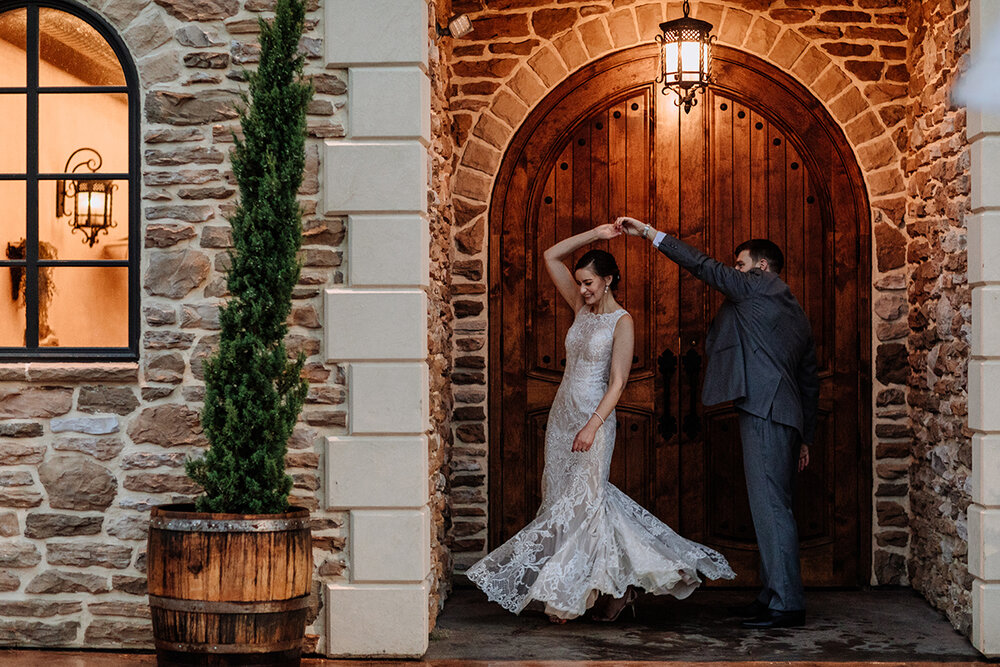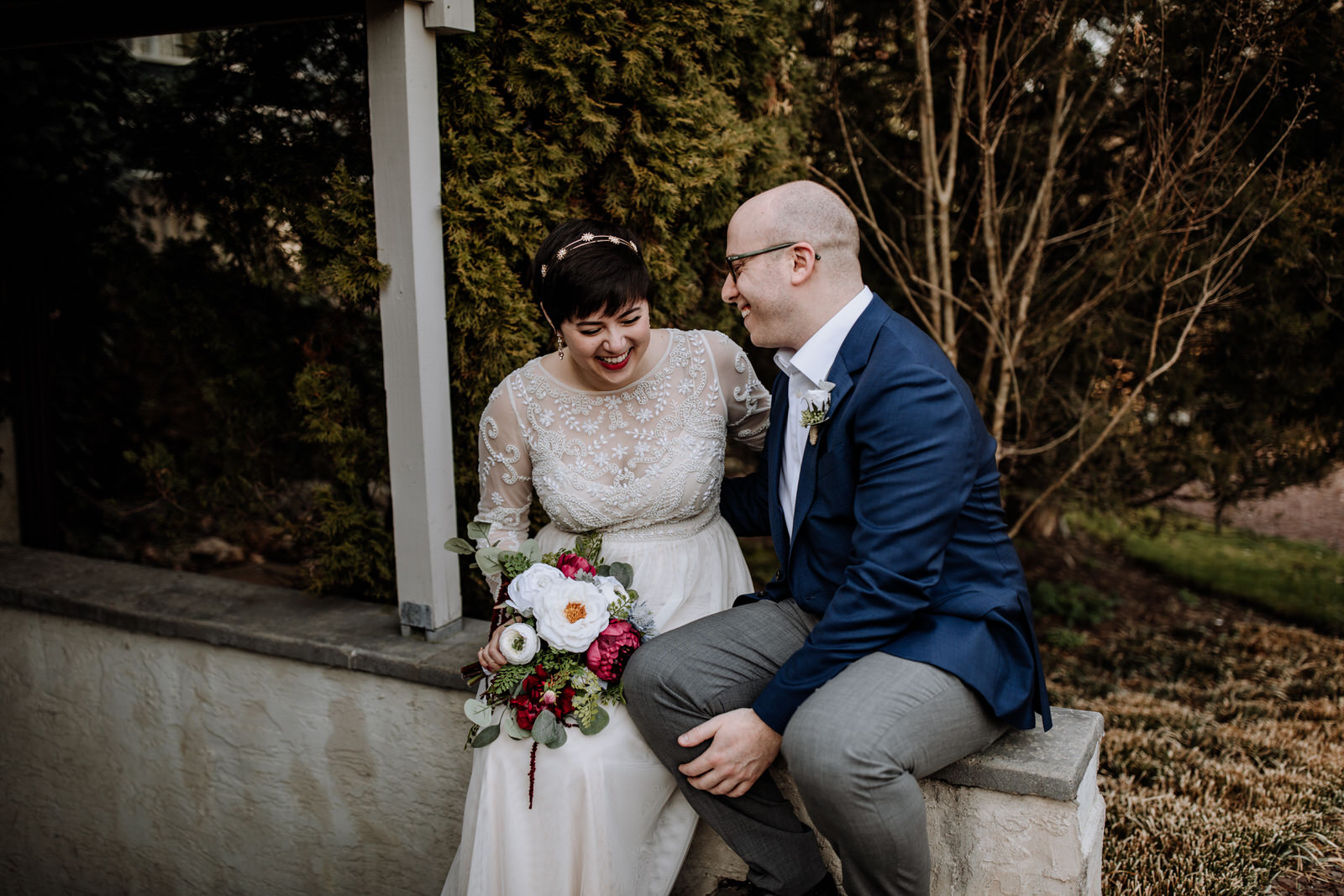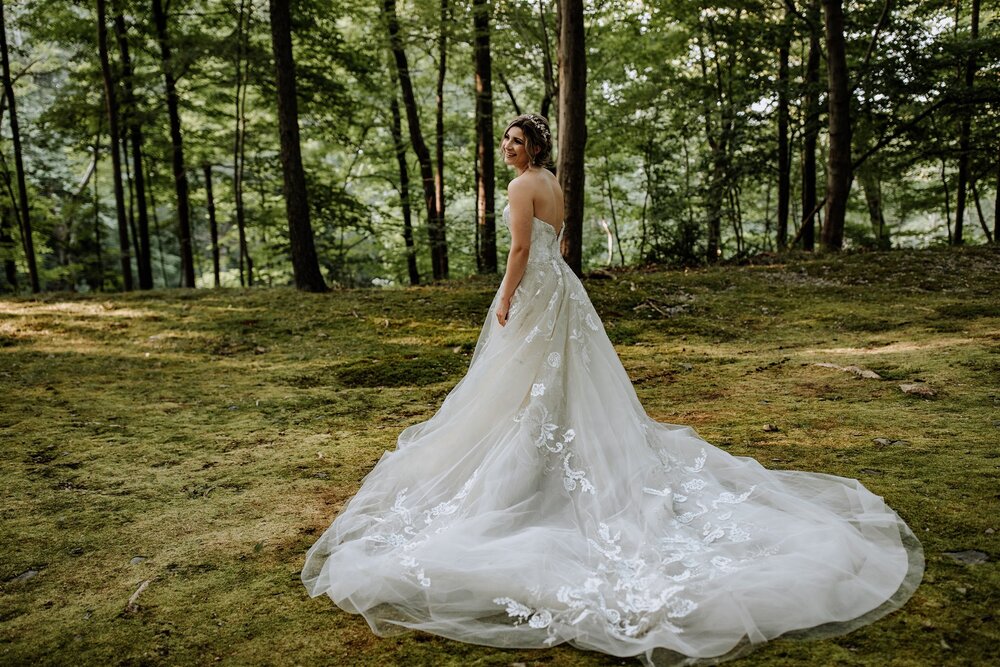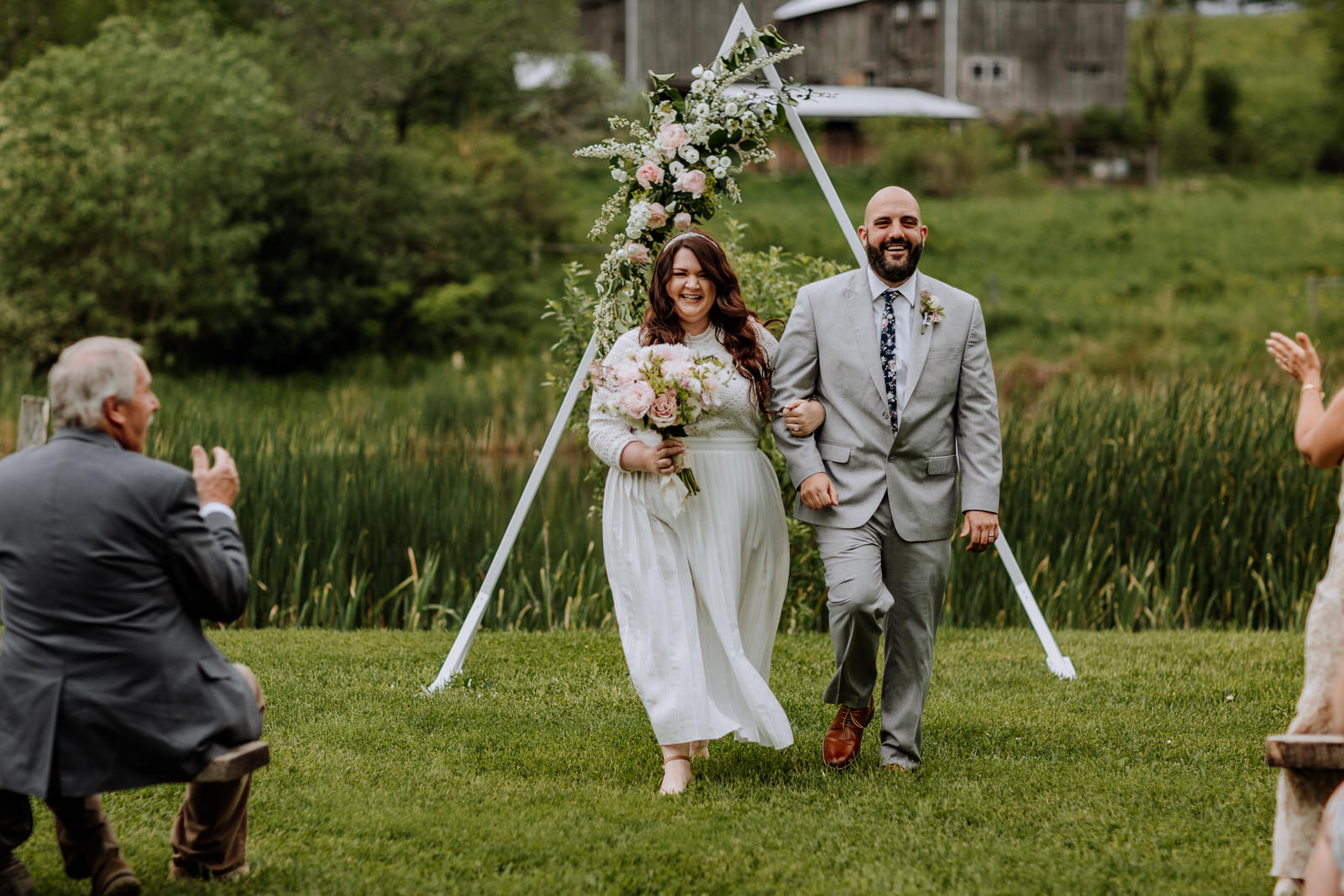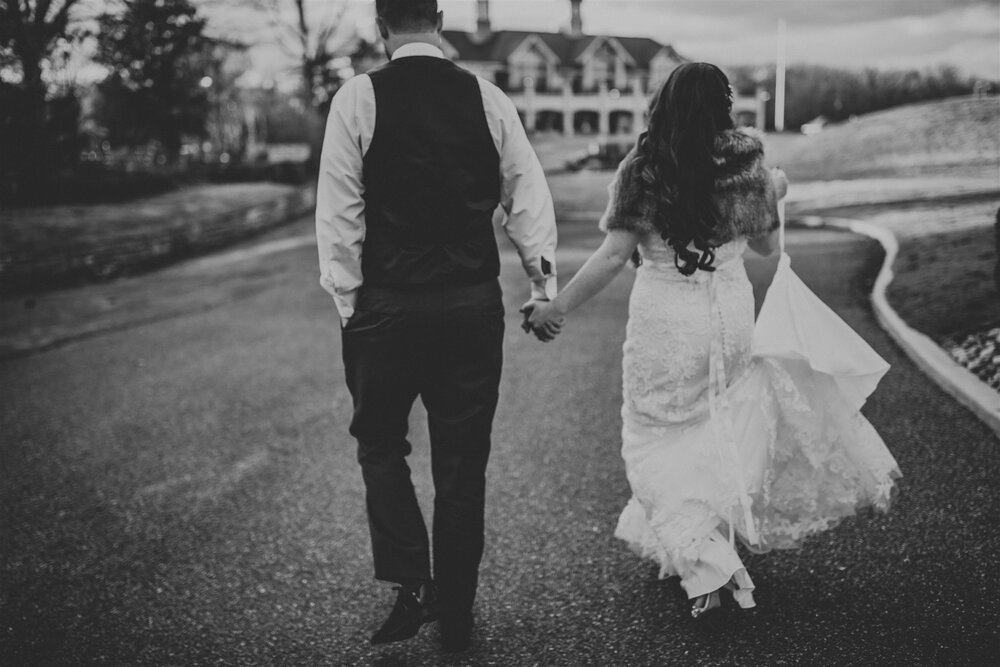One of the major goals you should have when planning your wedding is to keep stress to a minimum. This is a time in your life that should be fun, not overwhelming. Of course, that’s easy to say, but harder to practice.
A study by Zola asked about stress in wedding planning to 500 engaged or newlywed couples – and most people (71% of respondents) found wedding planning to be more nerve-wracking than other big life events like finding a new job. We get it – weddings are a big deal!
We regularly hear from couples who are feeling stressed out, and know what it’s like from experience when we planned our own wedding that took place back in 2016. We understand some of the stressors you may be feeling. Wedding planning involves a lot of moving parts and things you may have never even thought of.
What is very important to understand in this process is that stress also shows itself in many different ways. There is financial stress for couples who have limited budgets. There is stress on relationships as you are literally bringing two families together, and probably receiving input from parents (and other family members). There is even that hard-to-define type of anxiety that comes from just wanting everything to work out even if you’re otherwise feeling pretty balanced.
In this post, we want to give you some advice on wedding planning and how you can do it without stressing yourself out too much. We bring the experience of planning and getting married ourselves, and helping support the couples we photograph do the same.
Understand the difference between good stress and bad stress
Stress can either push you forward or hold you back.
Thinking outside of wedding planning for a moment, stress can be a big motivator to pursue a new career, to go out and socialize somewhere new, to try something new, and so on. In wedding planning, being a little stressed out from time to time isn’t going to be harmful to you. Instead, a little bit of stress can add that extra push to get things done. Weddings are big events – and it would be frightening if you didn’t get a little anxious in the process.
Of course, you’re probably not here because you see stress as a positive motivator in your life 🙂
Stress becomes a bad thing when it seriously hinders your ability to function. Harmful stress might show itself in these types of ways:
-
You just don’t want to make any more decisions
-
Outbursts of anger or depression
-
Fighting with family or your partner
If you’re at a point in wedding planning where you feel stressed out to the point that it’s causing these negative responses, we can help you identify things you can do to proactively alleviate your stress levels!
Communicate with your partner
In the wedding planning process, your partner should be your foundation.
While “communication” with your future husband or wife to be is an obvious wedding planning tip, we want to highlight a few ways this can be done specifically:
-
Schedule time to talk about your wedding day together – this approach will make the conversation more important than just talking about it while eating dinner or watching TV
-
Ask for their involvement – we see many weddings get planned predominately by one person in the relationship. That is a lot of responsibility for one person to handle. We find that couples who work together on their wedding planning find it much less stressful.
-
Understand what is important to your partner (and why) – having a conversation about what really matters during the wedding day can help you both prioritize the things you do in the wedding planning stage. We’ll talk more about wedding priorities shortly!
-
Be open to making compromises collaboratively – As a couple who has been together for 15 years now, we’ve learned a lot about communication and compromising for the greater good of our relationship. In wedding planning, you and your fiancé may not be 100% on the same page on everything, so it’s a good idea to work together to find compromises you can both be happy with!
Identify the financial support you will receive from parents
Money. Budgets. These are the two things that can often be viewed as the “killer of dreams” and drive a wedge between you and your loved ones during the wedding planning season.
We get it – planning a wedding within the restraints of a budget (whatever that budget may be) is not always easy. This is especially true when you begin to realize how much everything costs, and look for areas to cut corners in order to stay within the budget.
While setting a budget is a responsible thing to do – often wedding planning tips leave out having adult conversations with the people in your life who very well may be lending a hand financially.
Early in the wedding planning process, it’s valuable to meet with your parents (or whomever is close to you in your life) and understand if they will be offering financial support, and if so, how much they expect to be able to contribute.
Some families will freely give up this information, and others may not want to (or be able to) give support. Only you know the people in your life – so do what feels right for you.
No matter how things end up going, knowing how much you can expect in financial assistance goes a long way to setting a realistic budget.
Create a realistic budget
How do you create a realistic wedding budget?
There are a couple of things to know before diving into setting your own budget.
In the United States, the average wedding costs ~$35,000 dollars. Some regions are much more affordable (like down South), while other places demand a higher premium (like New York City).
Not just speaking as wedding photographers here, we recommend investing in reputable wedding vendors you connect with and like the work of.
When we planned our own wedding, these investments (some of them more than we anticipated) played a huge role in us really enjoying our wedding day instead of being frustrated by things not turning out as we expected.
If you are on a restricted budget, it is especially important to list the things that are most important to you. Often – the wedding venue and photographer is high up on the list for many couples. Of course, you could be someone who doesn’t care so much about photos and just wants everyone to have a great party, so maybe your priority lies in having the best DJ in town. Only you can decide what matters to you.
To set a budget, start by asking yourself 2 simple questions:
-
How much money will my family/friends be contributing to my wedding?
-
How much money can my partner & I contribute?
Once you know how much money you have to work with, then you can really begin your research.
Pro tip: for a wide range of reasons, more intimate weddings and elopement options are becoming increasingly popular for some couples. While there are great reasons to have a large wedding, these smaller options are also attractive for their often lower price tag.
Select reputable wedding vendors
Traditional weddings will include a wedding planner, photographer, videographer, DJ/band, catering, wedding venues, florists, and other great product and service providers that give emphasis to weddings.
Even non-traditional weddings like small elopements, courthouse nuptials, and backyard weddings may hire at least a few of these (as an example – we regularly photograph elopements where it’s just us, an officiant, and the couple + their close family).
Vendor selection is often the fun part of wedding planning, as well as a stressful part as you try to find people you can connect with, trust, and that can fit within your budget.
As we are aware that pricing for these wedding products and services can add up quickly, we highly recommend allocating more of your budget to the things that are most important to you.
Regardless of budget, it’s a good idea to get to know your vendors before booking with them. Fortunately, this (should be) easy to do. A few tips:
-
Ask friends/family for recommendations
-
If you’ve already booked a wedding venue or other vendors, ask them for recommendations
-
Research potential vendors on wedding websites (like The Knot) and social media
-
Do a Google search for “[Your Area] [vendor type]” – an example of this would be “Pennsylvania wedding venues” or “Lehigh Valley Wedding Photographers”
-
Narrow down the potential vendors and research them more thoroughly – look at other websites to get a sense of their reputation (read reviews on Facebook, The Knot, Google My Business, etc.)
-
Reach out to the vendors – how do they respond to you? Does it take them a long time, or are they quick? Are they personal, or do they use a canned copy-and-pasted email response? These are early indicators of what you can expect working with them.
Be transparent with wedding vendors about your budget
As a wedding vendor, when we talk to people about their budgets, we hear things ranging from “we don’t care how much we spend!” to “we have a budget – but it’s flexible for the right vendor” to “we are on a really limited budget and can’t go over it!”
Being honest for a moment, most people (us included) have budgets that we try to adhere to. Every week when we go to the grocery store, we try to keep our spending under $100. We don’t lose it if we spend $120 once in a while – because we know there is some flexibility when we just need a couple extra items.
But – in the same respect – a few years back we were much more restricted. Low paying jobs meant we aimed to keep our grocery bill around $75 – with no wiggle room.
People get married in all walks of life and at different points in their lives that will impact their budgets. The average American gets married between 20 and 40 years old – but the amount of money a 40 year old is making and has expendable is probably very different than the 20 year old for sure.
We know money can be an uncomfortable thing to talk about, but if you are on a legitimate budget, it’s a good practice to talk with the people you are considering hiring about this. Some vendors may be able to be flexible, or offer a customized package that suits your budget better.
Of course – not every wedding vendor will or can offer help. Those of us who charge a lot for our services do so because we are in demand, are reputable, and have bills and expenses to pay ourselves.
Hire a wedding planner
If the idea of wedding planning is stressful, time consuming, and tedious to you – then it’s a good idea to hire a wedding planner who can simplify this entire experience.
The more weddings we photograph, the more we have come to realize just how impactful a good wedding planner can be.
Unfortunately, wedding planners are often cut out when it comes to more restricted budgets. It’s worth knowing that the good ones can actually help you stick to a budget, find good vendors, and do so much more that you may not even realize. We’ve even worked with planners who took on day-of coordinating and helped resolve issues behind the scenes without the bride & groom even realizing – a major selling point for us as we’ve seen these things in action.
Prioritize your wedding planning
When we planned our wedding, one of the first things we did was make a list of things that need to be done. Sometimes this is a simple hand-written list, other times people create a super detailed Excel spreadsheet. Whatever your approach – the point is simple: prioritize things you have to do based on the level of importance.
Longer engagements = more time to plan
Couples who have longer engagements have more time to plan their wedding. As a result – the entire process is much less stressful because they can take their time finding the right vendors and doing all the nitty-gritty.
Most couples we work with tend to be getting engaged over a year out from their wedding. A few even have really long engagements of 2+ years that makes planning incredibly painless.
We have also worked with couples who have had shorter engagements – one planned a full wedding in just a few months.
You need to decide how long you want your engagement to be, then adjust your thinking accordingly. A shorter engagement is, most likely, going to be more stressful and time consuming while a longer one will be more relaxed.
Stick to a workout routine
We know we run the risk of sounding like a parent, because in a world of wedding planning to be done this is probably the last piece of advice you’ll care to hear. But – it’s an important one.
Taking care of yourself is one of the keys to reducing stress. At least, it can help you more effectively manage the stress that does come up, so you don’t feel like you’re being driven to the brink.
Over the years, we’ve had a constant on-again, off-again relationship with working out. But, we always come crawling back (even when we’re tired) because we know how it makes us feel much better.
Delegate tasks to family & friends who offer to help
This last wedding planning tip is simple, but hard for some to accept.
Identify the things you need to have full control over, and the things you can trust you family & friends to support you on.
When we planned our own wedding, we found that delegating out tasks became more valuable the closer we got to the big day. In the last week, it felt like everyone had to get on board to help us pull everything together!
Let’s Wrap It Up!
If you’re feeling stress out right now about wedding planning, we hope the tips & advice offered in this post can help you see some light in it. Your wedding day will be amazing when it gets here, and the stress of planning will all fade away when you get to see your partner on that special day!
Over the past few years, we’ve seen a ton of weddings, and have heard from couples about how they were feeling stressed out by it all. These experiences don’t fall of deaf ears – we’ve been there before ourselves, and even right now are helping some family who are planning their own weddings.
Looking for a wedding photographer and like what you see? Anyone who inquires about our wedding photography services will receive a copy of our 15 Wedding Planning Tips for FREE. So reach out today!
